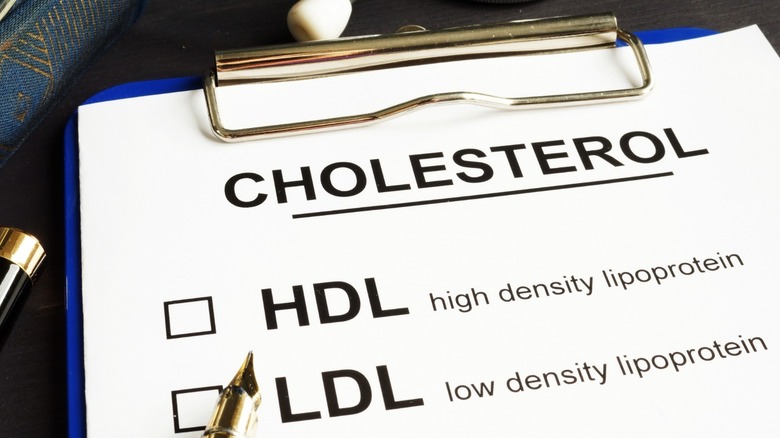High Cholesterol Affects Your Risks For Blood Clots More Than You Think
Cholesterol has had a bad reputation for some time. However, as with many stories, there are also two sides to the cholesterol story.
First off, cholesterol is not all bad — as long as your body maintains the appropriate levels. Cholesterol is produced in the liver and is important in supporting the human body, serving key functions related to hormones and bile production in the liver, among others. There are two kinds of cholesterol: HDL (high-density lipoprotein) cholesterol, known as the "good" cholesterol, and LDL (low-density lipoprotein) cholesterol, known as the "bad" cholesterol. HDL cholesterol helps remove excess LDL cholesterol from your arteries, per Healthline.
As described by Heart UK, the lipoproteins in HDL cholesterol are bundles of fats and proteins that move fats throughout your body via your bloodstream and also remove excess fat from your blood vessels. In addition, the lipoprotein in HDL cholesterol helps prevent inflammation caused by LDL cholesterol. In the right amounts, the lipoprotein in HDL cholesterol can also help protect your body from certain diseases, such as heart attack and stroke.
LDL cholesterol is the majority of the cholesterol in your body. While you need some LDL cholesterol, high LDL cholesterol levels can potentially cause serious health problems, per the Centers for Disease Control and Prevention (CDC).
How high cholesterol can cause blood clots
To find out if you have high cholesterol, it is important to get screened as part of your regular physical, per Everyday Health. If your cholesterol is high, it could put you at risk for blood clots because of plaques that can form in your arteries. The experts at Johns Hopkins Medicine describe plaques as fatty substances comprised of cellular waste, cholesterol, and fibrin. Fibrin is an insoluble protein that results from bleeding, and is what forms the foundation of blood clots, per Britannica.
Blood clots can form if plaque buildup ruptures, exposing the blood to its fatty materials. If a blood clot forms in your heart arteries, this can put you at risk for a heart attack; if it forms in your brain, this puts you at risk of having a stroke. Additionally, a blood clot can form in your veins, which is called venous thromboembolism (VTE). This scenario can lead to blood clots in your lungs, a dangerous condition known as a pulmonary embolism, per Everyday Health.
To prevent blood clots, health experts advise that you get regularly screened for cholesterol levels, and work with your doctor to mitigate risk factors, which may involve lowering your cholesterol levels by improving your diet, getting more exercise, or taking medication, notes Everyday Health.


